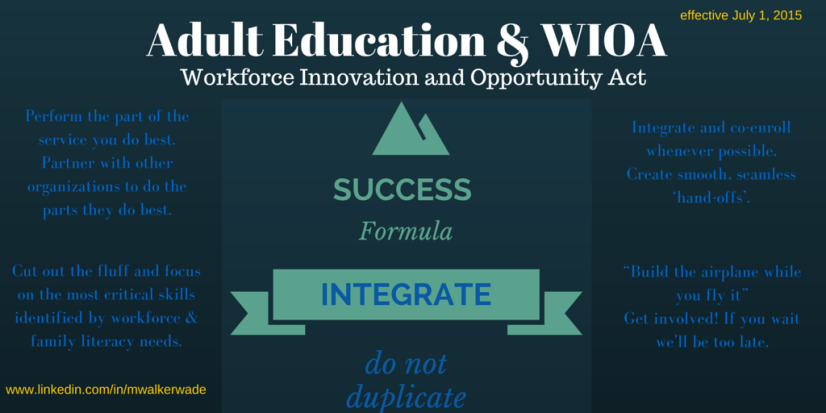Archive
Interesting Stats on The Education and Earnings Connection
Per the 2010 Help Wanted Report from the Center on Education and the Workforce…
► Having a high school diploma is worth about $569,000 more than being a dropout.
► Having some college but no degree or a postsecondary certificate is worth about $473,000 more than a high school degree.
► Having an Associate’s degree is worth about $15,000 more than some college but no degree.
► Having a Master’s degree is worth $457,000 more than a Bachelor’s degree.
But… Innovative entrepreneurs generally beat these odds.
Introducing the America’s College Promise Act 2015 (H.R. 2962)
On July 8, 2015 the House and Senate introduced the America’s College Promise Act 2015. This act would make up to two years of community college tuition-free for up to 9 million qualifying students. Funding could cover 100% of in-state tuition and fees (75% covered by Federal funding, 25% by State funding).
Eligible students:
- Must be enrolled in an eligible program at a community college for the first time
- Must attend college on at least a half time basis
- Must also maintain satisfactory progress in their course of study
- Must enroll in:
- academic programs that fully transfer to a bachelor’s or graduate degree at any public college or university in the state
- occupational skills training programs that lead to a recognized postsecondary credential in an in-demand industry sector or occupation in the state
The bill includes funding for community college, technical college, tribal colleges and historically black colleges and minority serving institutions.
It’s important to note:
- The Federal will provide $3.00 for every $1.00 of State funding.
- States’ must agree to participate.
- If a State opts-in, colleges must also commit to certain education reforms aimed at improving the quality of the educational experience and its outcomes.
- This act is in effort to build a strong workforce and global economy.
- Thus far, this act is not a bi-partisan effort. It was introduces by the democrats with 61 sponsors.
- With regards to community college, because this funding only applies to academic courses that are transferable to a 4-year institution, it cannot be used for remedial and/or non-transferable pre-requisite college courses.
As of July 2015, this act has not yet passed. It’s simply been ‘introduced’.
Click here and listen to an audio recording of the live press release.
A recent poll indicated nearly 70% of Americans oppose free community college. Based on the requirements introduced in this bill, what are your thoughts? Yay or nay?
Adult Literacy Education Providers Prep for WIOA’s Integrated Education and Training pt 2
THE WIA-TO-WIOA TRANSITION BEGINS JULY 1, 2015
THE UPCOMING ACADEMIC YEAR IS A YEAR OF CHANGE
In 2012 the U.S. Department of Education Office of Vocational and Adult Education produced a 30-page document titled: Promoting College and Career Readiness: Bridge Programs for Low-Skill Adults. If you read through it, you will see very sharp resemblances of what we as Education & Training professionals should be focusing on to gear up for WIOA changes on our campuses and in our classrooms. Some of the terms in the report vary from the terms in the WIOA proposal, but the meanings are the same.
♦♦♦ I will highlight some of the report’s content below ♦♦♦
Create bridge programs (“Pathways”) to help adult students identify career and education goals and develop the skills, content knowledge, and learning strategies needed to enter and succeed in postsecondary education and employment.
Combine (“Integrate”) basic skill instruction in reading, math, writing, and English language, including preparation for the GED test, employment skills, and college success strategies. Some bridge programs also offer college credit and certificates (“Nationally recognized credentials”), which may be the first step toward a college degree.
Use state and local labor market information develop bridge programs focused on occupations or industry sectors with a high demand for employees. ♦ Note: Your local Workforce Investment Board will need to be very involved in your education and training program planning, per WIOA.
For examples of what your education and training programs should emulate, consider these:
- Washington’s I-BEST approach: an integrated ABE (and now ELA) and CTE instructional planning process and co-teaching.
- Oregon Pathways for Adult Basic Skills Transition to Education and Work Initiative (OPABS) provided the impetus for the state’s Adult Basic Skills (ABS) system to incorporate career pathways and assist in transitioning learners into further education and employment, including formal connections to postsecondary education and OneStop Career Centers.
- (Alabama Community College has also gained recognition for being fairly “WIOA Ready’ and therefore also serve as a great example for planning and implementation.)
Finally…
Look to form partnerships with organizations such as these:
Jobs for the Future (JFF) Breaking Through and ABE to Credentials initiatives
The Joyce Foundation Shifting Gears initiative
The Nellie Mae Education Foundation New England ABE-to-College Transition project
The time to get involved and to start your transitional planning is now.
Sources:
http://www2.ed.gov/about/offices/list/ovae/pi/cclo/brief-1-bridge-programs.pdf
What Can I Do With That Degree?
We have built up the idea of getting a college degree as the complete key to success; yet, we clearly see that simply having a great education and an earned degree isn’t enough to keep you from being an unemployed (or under employed) job-seeker. Vocational colleges, on the other hand, have tooted their horn that students can quickly get in, get the skills needed for a particular career, and get to work.
I’m an advocate of education, and my particular area of interest is career education, having over 12 years of experience in this field. I talk to many adults trying to make decisions about their career, who are in transition, and who wonder should they go back to college for a 4-year degree, or go to a vocational institution and get a new job skill. There is no one right answer. Determining which way to go, and WHEN to take which move first requires a series conversations, soul searching, and personal research. The money and time you are getting ready to invest in “re-tooling” yourself should not be a quick, brash decision. As an adult learner with adult life responsibilities you must critically listen to college and career institution recruiters, and then do your own research. You should take time to find the answers for yourself to questions like:
- What can I REALLY do with that degree?
- Will that degree be enough, or will I need an advanced or accompanying degree to land a good job?
- How plenteous are the jobs in this field in my geographical area?
- What companies in my area look for people with my degree and or skill?
- Will my degree be enough, or will the employer want me to have other skills as well?
- What is the future of my industry of choice?
- Will the jobs I see now still be the same when I’ve finished my studies?
These questions can be daunting, time-consuming, and if not approached with the right attitude, could make a person less motivated to persist. But, trust me, and the thousands of degreed job-seekers whose student loan payments are eating them alive, getting the strategy upfront is much better than dealing with the crisis afterwards.
My opening question was: What can I do with that degree? Not looking at degrees such as Business, Marketing, Education, and other job-focused degrees, I want to give you a few resources to check out. The information here is just enough to give you some ideas, but it is in no way enough to say you’ve done your research. Take a look, and leave some feedback if you will.
DEGREE PROGRAMS
If you have any insight on the following degrees (undergraduate level preferred) please do share.
~ Blessings to you!
Prision vs. Princeton – Figures by Public Administration – Hmmmm?
You can check out the graphical presentation published by the Public Administration for yourself. I believe you will find it interesting and aesthetically pleasing; but before you get caught up on the hype, ponder this…
- From Princeton to Prison; that’s quite a big leap isn’t it? Does it not make you wonder why the sociologist responsible for publishing such a comparison did not use a more mainstream demographic selection? Princeton accepts only about 10% of it’s applicants.
- Check this out… Just a few scrolls down this image you will see figures comparing the number of African Americans in prison Vs. in college. This is one of those things that made me go “Hmmmmm…?” asking myself just why this publication singled out African Americans, showing no other race or nationality of people.
- And just in time for Occupy Wall Street’s Student Debt Refusal Campaign, take a look at the spending figures: 1 year in NJ State prison $44k; 1 year at Princeton $37k. At this rate, a student borrowing student loans could have a principal balance of $148k on a 4-year plan, and $185k on a 5-year plan – and don’t forget to accrue interest. The result could be a monthly student loan payment of $1050-$1310 per month. Ouch, right?
- I do appreciate seeing these figures; I only wish they were more realistic, making them useful in the eyes of young adults and low-skilled workers of every race and nationality. Nonetheless, it’s a good read… Enjoy.
Created by: Public Administration
“Occupy Student Debt”? I Understand… But I Must Pay Up
I attended Oral Roberts University for ONE year studying Christian Education & Psychology. After seeing the amount of debt accumulated for that year, my parents said: “Come home…” I cried and cried… prayed asked God for a miracle so I could stay at ORU. But, to no avail.
I went home, started working as an accounting clerk and went to school part-time studying accounting. I continued working in the field of accounting for several years while preparing to do more meaningful work. I eventually got there.
Years later I do not regret it one bit. I’m degree’d in Liberal Studies and Business Communications, and have hard-core skills and work experience that allow me to fund into ministry work. Having graduated from a Holy Names University, a private, Catholic institution, I took out even more student loans. I am still paying for my education, but in my situation I believe I glorify God by paying my loans. However, (just as an FYI) I neither agree nor disagree with the Occupy Study Loan initiative – but I certainly understand.
Related Articles:
Occupy Student Loans???
Occupy Student Loans??? Really???
Careful with this one protesters! Your latest plan to stop making your student loan payments, forcing them to default could come back to bite you in your golden years. Sallie and Fannie don’t mind waiting for their money.
I have paid (and am still paying) my share of student loans and I consider myself blessed because I am able to actually use the education I’m paying for. Contrary to some of the ideas of the Occupy Student Loans initiative, I do not believe higher education should be free. I do think people should REALLY consider the reality of the higher ed price tag before signing up. As one who is in education management, I wish I could convince our western society of how beneficial it is to get a hard-core, money-making skill and some work experience before pursuing the career of their passion – you know, the one that may or may not produce financial stability.
Here’s an informative video produced by InflationUS called “College Is A Scam”. It’s about 1 hour in length, very interesting and informative. While I DO NOT agree with everything said, I must say it is quite enlightening. I recommend you watch it with an open mind…
While I neither agree nor disagree with the Occupy Study Loan initiative, I do hope these young people understand the dicey risk they’re taking.








